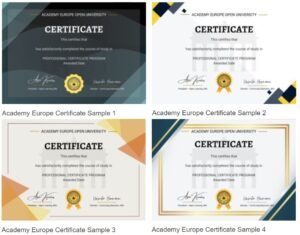Customer Relationship Management Course is based on text and video learning materials by Academy Europe.
This introductory guide to Customer Relationship Management (CRM) explores its multifaceted nature, encompassing strategic business approaches to building customer loyalty and profitability. Different perspectives are presented, including management strategies, technological applications (like CRM software), and the core business strategy integrating internal processes and external networks. The text highlights the importance of understanding modern customers and utilising high-quality data. Ultimately, it aims to provide beginners and professionals with a foundational understanding of CRM principles for career development and improved customer interaction.
Customer Relationship Management (CRM) in a very broad way can be defined as the efforts made towards creating, developing, and maintaining a healthy and long-lasting relationship with the customers using technology. This tutorial is an introductory guide to CRM that touches upon various topics such as understanding 21st century customers and managing them, building value for them, CRM software, and future trends in CRM.
Podcast Link: https://www.youtube.com/watch?v=MBHSEQCdVCo
1. Introduction & Purpose
This briefing document provides an overview of Customer Relationship Management (CRM) based on the introductory material provided by Academy Europe. The source material acts as an introductory guide to CRM, aimed at beginners seeking to understand the core concepts. It covers the definition of CRM from various perspectives, its primary goals, and intended applications. The purpose of this briefing is to summarise these key ideas and prepare the audience for further exploration of the topic.
2. Defining Customer Relationship Management (CRM)
The source highlights that CRM is a multi-faceted concept, best understood from different viewpoints. Here are the key definitions explored:
- Broad Definition: CRM is defined as “the efforts made towards creating, developing, and maintaining a healthy and long-lasting relationship with the customers using technology”. This implies a holistic approach involving various business activities.
- Management Perspective: From a management standpoint, CRM is “an organized approach of developing, managing, and maintaining a profitable relationship with customers.” This emphasizes the strategic and organised nature of CRM implementation with a focus on profitability.
- IT Perspective: When viewed through the lens of technology, IT organizations define CRM as “a software that assists marketing, merchandising, selling, and smooth service operations of a business.” This highlights the technological tools used to facilitate CRM practices.
- Academic Perspective: Franics Buttle, described as the “World’s first professor of CRM”, defines it as “the core business strategy that integrates internal processes and functions, and external networks, to create and deliver value to a target customer at profit.” He also emphasises that it is “grounded on high quality customer data and information technology.” This perspective underscores the strategic importance and holistic approach needed for effective CRM, connecting internal operations with external customer interaction, based on data and technology.
3. Primary Goal of CRM
The primary goal of CRM, according to the source, is to:
- Increase Customer Loyalty: CRM initiatives aim to enhance customer experiences and build lasting connections, resulting in greater customer retention.
- Improve Business Profitability: Ultimately, the increase in customer loyalty and repeat business will contribute to the financial success of the business.
4. Key Themes and Concepts
- Technology-Enabled: CRM is heavily reliant on technology, particularly CRM software, to manage customer interactions and data effectively.
- Strategic Importance: CRM is not just an operational function, but a core business strategy that should inform all business decisions.
- Data-Driven: Effective CRM is based on the collection and analysis of high-quality customer data to tailor experiences and improve business outcomes.
- Value Creation: CRM focuses on creating and delivering value to the target customer at a profit.
- Holistic approach: Integrating internal processes and functions, with external networks to be truly effective.
5. Target Audience
The learning material is designed for:
- Beginners: Those new to CRM and seeking a foundational understanding.
- Management Career Aspirants: Individuals planning a career in management who need to grasp customer relations and management.
- Customer-Facing Professionals: Those who interact with customers regularly and represent their companies.
6. Conclusion
This initial overview of CRM, as presented in the provided source, highlights its importance as a strategic and technologically-driven approach to building valuable relationships with customers. The primary focus is on increasing customer loyalty and driving business profitability. CRM requires a holistic approach from organisations, combining processes, data and technology, both internally and externally. The provided material is suitable for anyone new to the topic, particularly those aiming for careers in management or working directly with customers. Further research and deeper dives into different CRM aspects would be beneficial.
7. Next Steps/Recommendations
- Explore different types of CRM software and their features.
- Research best practices in customer relationship building.
- Consider how CRM can be implemented within [Your Organisation/Specific Area].
- Further exploration into specific areas of CRM such as: marketing, sales and service.
Dear Students,
The text and video based courses by Academy Europe are targeted at providing the students with the most important aspects of the theoretical and methodical materials. In addition, these courses will also focus on the philosophical background for the development and use of the theoretical background and are thus to be understood as partly complementary to the material of the course notes. It is assumed and strongly suggested that the students study and become familiar with the course notes.
Digital Support Resources
All of our Higher Education textbooks are accompanied by a range of digital support resources.
Each title’s resources are carefully tailored to the specific needs of the particular course’s readers.
Examples of the kind of resources provided include:
– A password protected area for instructors with, for example, PowerPoint slides, an instructor’s solutions manual and teaching notes for case studies included in the course.
– An area for students including, for example, useful spreadsheets to accompany case studies in the course, multiple choice questions, discussion questions spreadsheets and useful weblinks.
Empower Academy Europe
Join Academy Europe social media channels on Youtube, Facebook, Linkedin, Twitter and more. Share and like them by using your social media accounts.
Facebook: https://www.facebook.com/academyeurope
Twitter: https://twitter.com/academyeurope
Youtube: https://www.youtube.com/c/academyeurope
Linkedin: https://www.linkedin.com/company/academy-europe/
Certification
Academy Europe presents high-quality formal diplomas, certificates and e-certificates which are formal proof and recognition of accredited online courses. It shows all student’s abilities to learn and achieve high results and is very useful to promote personal career including with CVs, job applications and self improvements.

Curriculum
- 4 Sections
- 12 Lessons
- 10 Weeks
- Customer Relationship Management3
- Managing Customers3
- CRM Implementation2
- CRM and Automation4
Requirements
- Ideal candidates for the course would typically possess below:
- Discipline and attentiveness
- Ability to conduct research
- Ability to perform tasks with speed, efficiency, and accuracy
- Analytical judgment
- Patience to interpret technical/scientific data
- A willingness to learn, roll up your sleeves and work toward your dream!
- A computer, tablet or smartphone and an internet connection
- Basic computer skills
Features
- Before you start proceeding with this course on Academy Europe, we are assuming that you have a good aptitude and can think logically. You should want to try something different.
Target audiences
- This course by Academy Europe aims at imparting quality education and training to students.
- Academy Europe is dedicated to its students, their specific learning requirements, and their overall learning success.
- This course is directed toward a student-centered, independent study, asynchronous learning approach.
- After completing this course on Academy Europe, students will get self improvement and promotion in their careers.
- This course is based on at least two learning skills which are provided to the users through audio & visuals, videos, verbal presentations and articles, all of which are asynchronized with distance education approach.


